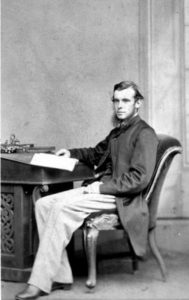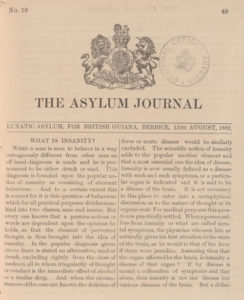At the time of emancipation, public health services in the Caribbean were all but non-existent. Many of the larger sugar estates made some provision for the care of the sick (it was in the planters’ interest to keep their slaves fit and healthy), but medical expertise was in short supply and when the estates closed there was little to take their place.
The passing of the Public Health Act in Britain in 1848, however, made health the concern of the state, and this sea change was reflected in the Caribbean colonies, as health services were introduced in the second half of the nineteenth century.

The Asylum Journal is a remarkable testimony to the advanced and enlightened state of care provided for the mentally ill in British Guiana. Written by Dr Robert Grieve (1839-1906), medical superintendent of the public lunatic asylum at Berbice, it documents his dedication to the welfare of his patients and his determination to make the asylum a place of humane care.
Robert Grieve
Grieve graduated MD from the University of Glasgow in 1861, and LRCS Edinburgh. He was born in Lilliesleaf, in the Scottish Borders, on March 4, 1839, the eldest son of James, a surgeon.
Between 1861 and 1862, Grieve served as an Assistant Surgeon in the Royal Navy, taking part in actions against Taiping Rebels near Shanghai.
In 1862, Grieve entered into private practice at Howden, Yorkshire. In 1870, Dr Grieve spent some time in Darmstadt, Germany where he provided surgical assistance at the Orangeries Hospital during the Franco-Prussian War (1870-1871). For his outstanding services, he was awarded a German War Medal for non-combatants.
Between 1870 and 1875, Grieve worked as Medical Superintendent of the Metropolitan Asylum Hospital at Hampstead, London.
In 1875 he was appointed Medical Superintendent of the Public Lunatic Asylum in Berbice, British Guiana, where he stayed for nearly ten years. As a Superintendent, Grieve implemented a number of reforms and successfully introduced humanitarian treatment of the patients at the Asylum. His time in Berbice was well documented in The Asylum Journal, which Grieve authored, published and distributed between 1881 and 1885. In 1886, he was promoted to the post of Surgeon General and transferred to the capital of Guyana, Georgetown, where he devoted another decade to the amelioration of sanitary conditions in the colony.
After contracting syphilis while operating on an infected patient, Grieve was forced to retire and left Guyana on April 19, 1894. On his retirement he was appointed CMG (Companion of the Order of St Michael and St George) for his outstanding and valuable services.
Grieve returned to his native Scotland and resided in Lasswade, Midlothian for some time. He died on November 15, 1906 in Barton on Humber, England.

At the asylum, Grieve adopted a policy of non-restraint of inmates whenever possible, introduced occupational therapy, had the asylum wards decorated in bright colours and adorned with pictures and flowers and arranged a programme of activities and entertainment. There was a weekly dance and a weekly band concert. Patients could work on the farm, in the carpentry workshop, in painting and decorating, in tailoring or shoemaking or in the asylum bakery.
The Asylum Journal was printed by patients at the asylum’s own printing press. In the journal, as well as reporting on these activities, Grieve gives mortality, sickness and discharge rates and includes features on recent developments in medical knowledge, on public health issues in the colony and on his own findings from observation of his patients.
He observed that admissions to the asylum were notably higher for people not born in the colony, attributing this partly to the fact that native inhabitants were more likely to be looked after at home by family members and partly to the recent lone immigrant’s sense of alienation and rootlessness in an unfamiliar environment.
Crime or insanity
According to The Caribbean Press’ The Asylum Journal, on the morning of February 15, 1881 at daylight a report was brought to the asylum that an attempt had been made to steal two of the boats belonging to the institution. This was true and the boats were found at the Canje Bridge where their passage had been arrested by a man that had been an attendant and who recognised them.
The account this man gave of the matter was as he was passing the Canje Bridge he saw the two boats being drifted up the stream in charge of a [man] who was naked and asked him where he was taking the boats to. The man responded: “I am taking them up the Canje to a wood-cutting grant I have there.”
The attended told the man this could not be true as they were the asylum’s boats and ordered him to stop at once, at the same time calling out for the assistance of the Police. The man proceeded to jump from the boat into the river and, swimming ashore, disappeared in the bush.
The boats were found properly lashed together and several articles of clothing belonging to an officer of the asylum were concealed. On examining the place from which the boats were taken, it was seen that the iron chain with which one of them was made fast had been broken through apparently by a blow from a brick. This reads like an account of an ordinary theft distinguished only by its audacity. The fact of the thief being naked has no significance in this country where most burglaries are committed by persons clothed only in nature’s vestments. That a man should attempt to carry off two boats by trusting to the current of the tide and without oars might in countries where crimes are neither so stupidly nor audaciously committed and where detection is more certain, have raised suspicion, here it was not considered so very extraordinary. The thief knew he was stealing and also tried to avoid capture, still in the strict sense of the word he was no thief at all, as it afterwards turned out the whole thing was the act of an undoubted madman.
On February 22 a patient was admitted to the asylum from the Colonial Hospital Berbice and in his papers it was stated that he had on the morning of February 15 left the hospital naked and was brought back on February 19 by the police having found his way in the same condition to his brother’s house at Glasgow – a village about two miles from New Amsterdam. This was the individual who stole the boats; he is now and was then maniacal [exhibiting extremely wild or violent behaviour]. He talks freely of his exploit and says he was commanded from heaven to do it.
The lessons to be learned from this case are firstly that the actions of the insane are not always purposeless and, secondly, that “mad doctors” may sometimes be right when they ascribe the performance of what seems a well-planned criminal act to insanity. (Information from www.kingscollections.org; www.universitystory.gla.ac.uk; http://caribbeanpress.org)



